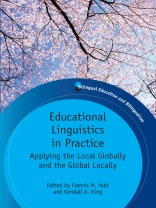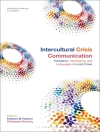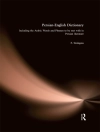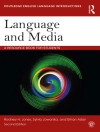This volume provides a state-of-the-art snapshot of language and education research and demonstrates ways in which local and global processes are intertwined with language learning, use, and policies. Reflecting but also expanding on Nancy Hornberger’s ground-breaking contributions to educational linguistics, this book brings together leading international scholars. Chapters present new research and cutting-edge syntheses addressing current theoretical and methodological issues in researching equity, access, and multilingual education. Organized around three central themes — bilingual education and bilingualism, the continua of biliteracy, and policy and planning for linguistic diversity in education — the volume reflects the holistic and dynamic perspective on language (in) education that is the hallmark of educational linguistics as a field.
Daftar Isi
Foreword – Colin Baker and Mike Grover
Introduction: Global and Local Connections in Educational Linguistics – Francis M. Hult and Kendall A. King
Section I: Bilingual Education and Bilingualism Thematic Overview: Language policies, multilingual classrooms: Resonances across continents – Marilyn Martin-Jones
1 Language Teacher Education and Teacher Identity – Manka Varghese
2 Terrorism, Nationalism and Westernization: Code Switching and Identity in Bollywood – Viniti Vaish
3 Making Local Practices Globally Relevant in Researching Multilingual Education – Angela Creese
Section II: Continua of Biliteracy Thematic Overview: The Continua of Biliteracy and New Literacy Studies – Brian Street
4 Continuing the Continua: Why Content Matters in Biliterate Citizenship Education – Ellen Skilton-Sylvester
5 Literacy in Two Lands: Refugee Women’s Shifting Practices of Literacy and Labor – Daryl Gordon
6 Poetic Anthropology and the Lyric Continua between Science and Art – Melisa Cahnmann-Taylor
Section III: Policy and Planning for Linguistic Diversity in Education Thematic Overview: Unpeeling, Slicing, and Stirring the Onion – Questions and Certitudes in Policy and Planning for Linguistic Diversity in Education – Teresa L. Mc Carty
7 Implementational and Ideological Spaces in Bilingual Education Policy, Practice, and Research – David Cassels Johnson
8 Quechua Language and Education Policy in the Peruvian Highlands – Serafín Coronel-Molina
9 An Ecological Perspective for Planning Chinese Language in the United States – Shuhan Wang
Afterword: Cooking with Nancy – Richard Ruiz
Tentang Penulis
Kendall A. King is a Professor of Second Language Education at the University of Minnesota. Her scholarship examines ideological, interactional and policy perspectives on second language learning and bilingualism, with particular attention to educational practices impacting language use among Indigenous populations in Latin America and Spanish and Somali speakers in the U.S. She teaches graduate-level courses in sociolinguistics, language policy, language research methods, and language education and undergraduate courses in linguistics, and is incoming president of the American Association of Applied Linguistics.












